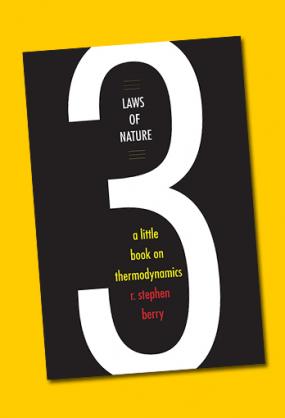When R. Stephen Berry joined the University of Chicago faculty in 1964, he was not prepared for the city’s pollution.
“I was quite angry,” recalled Berry, the James Franck Distinguished Service Professor Emeritus in Chemistry. “Chicago was smoky and smelly, and there’d be a layer of gray dirt on your windshield each morning.”
Berry fired off a letter to the mayor and local alderman voicing his concerns, and was soon invited to tour the city’s air pollution facilities. That visit helped inspire his environmental activism and a pioneering scholarly career that began with a landmark idea called the “life-cycle analysis”—the tally of a product’s environmental impact through all stages, from its production to its disposal.
This research was also the basis for Berry’s lifelong interest in thermodynamics and passion for teaching non-scientists about science. The 88-year-old recently published a book, Three Laws of Nature: A Little Book on Thermodynamics, which discusses the fundamentals and history of this science, with the aim of engaging both students and non-scientists.
In this edited Q&A, the former MacArthur fellow explores his environmental work, his inspiration for writing the book and what thrills him about science.
What inspired you to write Three Laws of Nature?
There was a British scientist and novelist named C.P. Snow who argued that non-scientists should know as much about thermodynamics as scientists know about Shakespeare. Over the years, I’ve become very concerned with scientific illiteracy. I taught a physical sciences class for undergraduates and then a course at the Graham School for non-scientists, and I realized that there are people who have no concept of what a scientific law is or how you can express scientific ideas.
I came to see thermodynamics as a vehicle for teaching people what science is, how we use it, and how it evolves. Everybody has an intuitive feel for what heat and temperature are. You don’t have to know many facts at all because it’s based on such a familiar experience.
What drew you to the study of thermodynamics?
Through my involvement in the environmental movement in the ‘60s, I came to feel strongly that just putting precipitators (filtration devices that remove particles like dust and smoke) on the power plants wasn’t enough. I wanted to look at the automobile as a manufactured object, studying the entire process from the ore in the ground all the way to disposal. In each step, we compared the actual energy and free energy use with the ideal thermodynamic limits. The notion being that where the discrepancy was largest was where you had the greatest leverage for technological change and improvement. That was one of the first publications of what became known as life cycle analysis, which have now been done on quite a variety of objects that we use every day.
One day, someone was talking to me about what we were doing. He asked why we were comparing the ideal thermodynamic limit with the actual free energy. After all, the ideal limit is based on an infinitely slow ideal process. He said, ‘Why would someone order an automobile from a manufacturer who makes his cars infinitely slowly? Who would wait for delivery?’ That was a very interesting question because it raised a challenge for me and stimulated what turned out to be many years of work in a subject that later became known as finite time thermodynamics.
What are some of the things you want readers to take away from your book?
I think it’s important for readers to know a little about the history of science, which is as much about how we formed the questions as it is about how we found the answers.
This year, it’s the 100th anniversary of the periodic table. Before then, no one had formally related elements with similar behaviors or looked at patterns in atomic weights in such a way. It was an enormously original breakthrough. Science is full of stories like that. Right now, people are inventing new mathematics to understand nature. I want readers to recognize that there are so many things we still don't understand, like dark matter and dark energy. And, presumably, so many questions we haven't even thought of yet.
When I was in graduate school, no one wanted to study thermodynamics because we thought all the questions had been asked and there was nothing left to be done. But my own work in finite time thermodynamics shows how silly and wrong we were. Science doesn't close, and that's part of the thrill.
Berry will discuss his book at the Seminary Co-op bookstore at 6 p.m. on May 24.
—This story first appeared on the Physical Sciences Division website.
